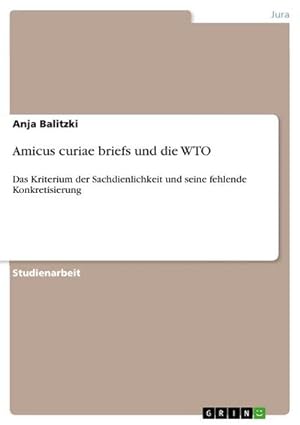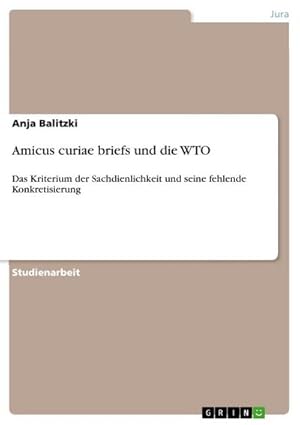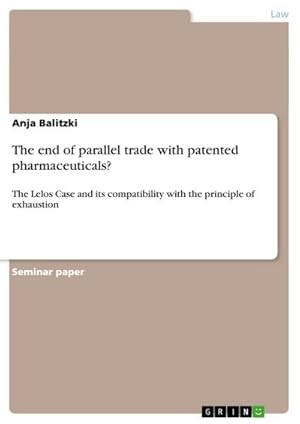ANJA BALITZKI (7 risultati)
Tipo di articolo
- Tutti gli articoli
- Libri (7)
- Riviste e Giornali
- Fumetti
- Spartiti
- Arte, Stampe e Poster
- Fotografie
- Mappe
-
Manoscritti e
Collezionismo cartaceo
Condizioni
- Tutte
- Nuovi
- Antichi o usati
Legatura
- Tutte
- Rilegato
- Brossura
Ulteriori caratteristiche
- Prima edizione
- Copia autografata
- Sovraccoperta
- Con foto
- No print on demand (4)
Paese del venditore
Valutazione venditore
-
The Martens clause
Editore: GRIN Verlag Aug 2009, 2009
ISBN 10: 3640406338ISBN 13: 9783640406333
Da: BuchWeltWeit Ludwig Meier e.K., Bergisch Gladbach, Germania
Libro Print on Demand
Taschenbuch. Condizione: Neu. This item is printed on demand - it takes 3-4 days longer - Neuware -Seminar paper from the year 2007 in the subject Law - Comparative Legal Systems, Comparative Law, grade: 1,3, University of Bremen, language: English, abstract: Humanitarian law seems to become a more and more important topic in international law because of events like the war in Iraq and the increasing problems and differences between radical Islamic people and western states. There seems to be a change of attitudes as large parts of our society increasingly show that they are against wars, especially, when civilians and innocent people are wounded or even killed.The Martens clause could be an appropriate means to limit the force and brutality in wars and to remind states that they cannot do what they want and that there are principles, which must be respected, also concerning such situations. The emphasis of this paper lays on a legal examination of the clause and highlights its possible role as an independent source of international law. The author of this paper wants to explain today's meaning and scope of the Martens clause in humanitarian law and consequently its (possible) influence on the conduct of states. 16 pp. Englisch.
-
Amicus curiae briefs und die WTO
Editore: GRIN Verlag Sep 2009, 2009
ISBN 10: 3640430131ISBN 13: 9783640430130
Da: BuchWeltWeit Ludwig Meier e.K., Bergisch Gladbach, Germania
Libro Print on Demand
Taschenbuch. Condizione: Neu. This item is printed on demand - it takes 3-4 days longer - Neuware -Studienarbeit aus dem Jahr 2009 im Fachbereich Jura - Zivilrecht / Handelsrecht, Gesellschaftsrecht, Kartellrecht, Wirtschaftsrecht, einseitig bedruckt, Note: 1,3, Universität Bremen, Sprache: Deutsch, Abstract: Am 9. Februar dieses Jahres hat der Appellate Body der WTO seinen Jahresbericht 2008 veröffentlicht. Zum Inhalt des Berichts gehört unter anderem der Fall China Auto Parts, in welchem dem Appellate Body ein amicus curiae brief unaufgefordert zugesandt wurde. Diesen stufte der Appellate Body allerdings als nicht erforderlich für seine Entscheidungsfindung ein. Solch eine Formulierung kann mittlerweile in Bezug auf amicus curiae briefs als typisch bezeichnet werden. Eine genaue Begründung der Ablehnung solcher briefs durch den Appellate Body oder die Panels erfolgte bisher nur bedingt, was zu Rechtsunsicherheit geführt hat. Diese Arbeit beschäftigt sich daher mit dem Kriterium der Sachdienlichkeit, welches der Appellate Body zwar innerhalb der Streitbeilegung entwickelt, aber nur in begrenztem Maße näher konkretisiert und ausgelegt hat. Im ersten Teil (2.) wird auf die Herkunft und Bedeutung von amicus curiae briefs eingegangen. Dadurch soll dem Leser deutlich gemacht werden, warum dieses Thema im Rahmen der WTO kontrovers diskutiert wird. Daraufhin (3.) erfolgt eine genauere Beschreibung der Zulassung und Handhabung von amicus curiae briefs anhand von Streitbeilegungsverfahren der WTO. Im folgenden Teil (4.) wird erläutert, warum es einer näheren Konkretisierung des Kriteriums für amicus curiae briefs bedarf. Außerdem wird herausgestellt, woran es an der jetzigen Rechtslage mangelt und inwiefern dies gelöst werden könnte. Aufgrund der vorgegebenen Länge der Arbeit ist es nicht möglich einen allgemeinen Überblick über die Problematik der amicus curiae briefs zu geben. Auch beschränkt sich daher die Beschreibung der Streitbeilegungsverfahren auf das Wesentliche im Hinblick auf die Sachdienlichkeit. Das Ziel dieser Arbeit ist es, zum einen das Kriterium der Sachdienlichkeit darzustellen und zum anderen, darauf aufbauend, einen Vorschlag zur Konkretisierung dieses Kriteriums zu machen. Sie dient zugleich als potentieller Aufruf an die Mitglieder der WTO sich der Dringlichkeit dieser Aufgabe bewusst zu werden. 20 pp. Deutsch.
-
The end of parallel trade with patented pharmaceuticals?
Editore: GRIN Verlag Okt 2009, 2009
ISBN 10: 3640454138ISBN 13: 9783640454136
Da: BuchWeltWeit Ludwig Meier e.K., Bergisch Gladbach, Germania
Libro Print on Demand
Taschenbuch. Condizione: Neu. This item is printed on demand - it takes 3-4 days longer - Neuware -Seminar paper from the year 2009 in the subject Law - Media, Multimedia Law, Copyright, grade: 1,3, Carl von Ossietzky University of Oldenburg, language: English, abstract: The pharmaceutical sector is recently in the focus of the academic literature, as it becomes more and more an important topic on the European level. Especially the relationship between patent and competition law can lead to problems and is consistently discussed. In September 2008 the ECJ had to make a decision in a case between a pharmaceutical manufacturer and his distributors, in which both fields of law played an important role. Because of these recent developments the objective of this thesis is to analyse the current relation between patent and competition law by laying the emphasis on the phenomenon of parallel trade. This work will focus on the abovementioned Lelos Case and its implications for the principle of exhaustion.It does not deal with patent or competition law in detail, but contains the most important aspects in order to explain the consequences of the ECJ's decision. Furthermore, the aspect of costs for research and development cannot be described extensively, but will be mentioned with regard to Lelos. The reason for that is the predetermined length of the thesis and the specific question, which the author has developed as a result of the Lelos Case.At first the relevant conditions on the pharmaceutical market will be briefly shown (2.) in order to explain why especially in this sector parallel trade is such an important issue. Then, the general tension between patent and competition law will be described, by depicting the most important characteristics and jurisprudence in both fields of law (3.). The next chapter deals with the Lelos Case (4.). The decision to illustrate AG Colomer's opinion is the result of his different approach to the case in comparison to the point of view of the defendant (i.e. GlaxoSmithKline). After that, a result regarding the impact of the ECJ's decision on parallel trade and the principle of exhaustion will be given (5.). In this chapter it will be shown how legal writers estimate the consequences and evolutions of the Lelos Case in practice.This thesis shall show how the ECJ has influenced parallel trade in patented pharmaceuticals in the future and what this means for the so far in EC law highly protected principle of exhaustion. 28 pp. Englisch.
-
Amicus curiae briefs und die WTO : Das Kriterium der Sachdienlichkeit und seine fehlende Konkretisierung
Editore: GRIN Verlag, 2009
ISBN 10: 3640430131ISBN 13: 9783640430130
Da: AHA-BUCH GmbH, Einbeck, Germania
Libro
Taschenbuch. Condizione: Neu. Druck auf Anfrage Neuware - Printed after ordering - Studienarbeit aus dem Jahr 2009 im Fachbereich Jura - Zivilrecht / Handelsrecht, Gesellschaftsrecht, Kartellrecht, Wirtschaftsrecht, einseitig bedruckt, Note: 1,3, Universität Bremen, Sprache: Deutsch, Abstract: Am 9. Februar dieses Jahres hat der Appellate Body der WTO seinen Jahresbericht 2008 veröffentlicht. Zum Inhalt des Berichts gehört unter anderem der Fall China Auto Parts, in welchem dem Appellate Body ein amicus curiae brief unaufgefordert zugesandt wurde. Diesen stufte der Appellate Body allerdings als nicht erforderlich für seine Entscheidungsfindung ein. Solch eine Formulierung kann mittlerweile in Bezug auf amicus curiae briefs als typisch bezeichnet werden. Eine genaue Begründung der Ablehnung solcher briefs durch den Appellate Body oder die Panels erfolgte bisher nur bedingt, was zu Rechtsunsicherheit geführt hat. Diese Arbeit beschäftigt sich daher mit dem Kriterium der Sachdienlichkeit, welches der Appellate Body zwar innerhalb der Streitbeilegung entwickelt, aber nur in begrenztem Maße näher konkretisiert und ausgelegt hat. Im ersten Teil (2.) wird auf die Herkunft und Bedeutung von amicus curiae briefs eingegangen. Dadurch soll dem Leser deutlich gemacht werden, warum dieses Thema im Rahmen der WTO kontrovers diskutiert wird. Daraufhin (3.) erfolgt eine genauere Beschreibung der Zulassung und Handhabung von amicus curiae briefs anhand von Streitbeilegungsverfahren der WTO. Im folgenden Teil (4.) wird erläutert, warum es einer näheren Konkretisierung des Kriteriums für amicus curiae briefs bedarf. Außerdem wird herausgestellt, woran es an der jetzigen Rechtslage mangelt und inwiefern dies gelöst werden könnte. Aufgrund der vorgegebenen Länge der Arbeit ist es nicht möglich einen allgemeinen Überblick über die Problematik der amicus curiae briefs zu geben. Auch beschränkt sich daher die Beschreibung der Streitbeilegungsverfahren auf das Wesentliche im Hinblick auf die Sachdienlichkeit. Das Ziel dieser Arbeit ist es, zum einen das Kriterium der Sachdienlichkeit darzustellen und zum anderen, darauf aufbauend, einen Vorschlag zur Konkretisierung dieses Kriteriums zu machen. Sie dient zugleich als potentieller Aufruf an die Mitglieder der WTO sich der Dringlichkeit dieser Aufgabe bewusst zu werden.
-
The Martens clause : Origin of a new source of International law?
Editore: GRIN Verlag, 2009
ISBN 10: 3640406338ISBN 13: 9783640406333
Da: AHA-BUCH GmbH, Einbeck, Germania
Libro
Taschenbuch. Condizione: Neu. Druck auf Anfrage Neuware - Printed after ordering - Seminar paper from the year 2007 in the subject Law - Comparative Legal Systems, Comparative Law, grade: 1,3, University of Bremen, language: English, abstract: Humanitarian law seems to become a more and more important topic in international law because of events like the war in Iraq and the increasing problems and differences between radical Islamic people and western states. There seems to be a change of attitudes as large parts of our society increasingly show that they are against wars, especially, when civilians and innocent people are wounded or even killed.The Martens clause could be an appropriate means to limit the force and brutality in wars and to remind states that they cannot do what they want and that there are principles, which must be respected, also concerning such situations. The emphasis of this paper lays on a legal examination of the clause and highlights its possible role as an independent source of international law. The author of this paper wants to explain today's meaning and scope of the Martens clause in humanitarian law and consequently its (possible) influence on the conduct of states.
-
The end of parallel trade with patented pharmaceuticals? : The Lelos Case and its compatibility with the principle of exhaustion
Editore: GRIN Verlag, 2009
ISBN 10: 3640454138ISBN 13: 9783640454136
Da: AHA-BUCH GmbH, Einbeck, Germania
Libro
Taschenbuch. Condizione: Neu. Druck auf Anfrage Neuware - Printed after ordering - Seminar paper from the year 2009 in the subject Law - Media, Multimedia Law, Copyright, grade: 1,3, Carl von Ossietzky University of Oldenburg, language: English, abstract: The pharmaceutical sector is recently in the focus of the academic literature, as it becomes more and more an important topic on the European level. Especially the relationship between patent and competition law can lead to problems and is consistently discussed. In September 2008 the ECJ had to make a decision in a case between a pharmaceutical manufacturer and his distributors, in which both fields of law played an important role. Because of these recent developments the objective of this thesis is to analyse the current relation between patent and competition law by laying the emphasis on the phenomenon of parallel trade. This work will focus on the abovementioned Lelos Case and its implications for the principle of exhaustion.It does not deal with patent or competition law in detail, but contains the most important aspects in order to explain the consequences of the ECJ's decision. Furthermore, the aspect of costs for research and development cannot be described extensively, but will be mentioned with regard to Lelos. The reason for that is the predetermined length of the thesis and the specific question, which the author has developed as a result of the Lelos Case.At first the relevant conditions on the pharmaceutical market will be briefly shown (2.) in order to explain why especially in this sector parallel trade is such an important issue. Then, the general tension between patent and competition law will be described, by depicting the most important characteristics and jurisprudence in both fields of law (3.). The next chapter deals with the Lelos Case (4.). The decision to illustrate AG Colomer's opinion is the result of his different approach to the case in comparison to the point of view of the defendant (i.e. GlaxoSmithKline). After that, a result regarding the impact of the ECJ's decision on parallel trade and the principle of exhaustion will be given (5.). In this chapter it will be shown how legal writers estimate the consequences and evolutions of the Lelos Case in practice.This thesis shall show how the ECJ has influenced parallel trade in patented pharmaceuticals in the future and what this means for the so far in EC law highly protected principle of exhaustion.
-
Die Bekämpfung der Markenpiraterie : Die Grenzbeschlagnahme auf deutscher und europäischer Ebene
Editore: GRIN Verlag, 2009
ISBN 10: 3640403673ISBN 13: 9783640403677
Da: AHA-BUCH GmbH, Einbeck, Germania
Libro
Taschenbuch. Condizione: Neu. Druck auf Anfrage Neuware - Printed after ordering - Bachelorarbeit aus dem Jahr 2008 im Fachbereich Jura - Medienrecht, Multimediarecht, Urheberrecht, Note: 1,4, Carl von Ossietzky Universität Oldenburg, Sprache: Deutsch, Abstract: Das Phänomen der Produkt- und Markenpiraterie hat in den letzten Jahren stark zugenommen. Bei der Grenzbeschlagnahme können Waren, die möglicherweise Rechte eines Markeninhabers verletzen, unter bestimmten Voraussetzungen vom Zoll aufgehalten werden, bis eine Entscheidung darüber ergangen ist, ob es sich tatsächlich um eine Schutzrechtsverletzung handelt. Ein Eingreifen zu diesem Zeitpunkt hat den Vorteil, dass die Waren nicht auf den jeweiligen Markt gelangen. Auch der europäische Gesetzgeber hat schon seit einiger Zeit die negativen Auswirkungen der Markenpiraterie auf den europäischen Binnenmarkt erkannt und entsprechend Maßnahmen ergriffen.Ziel der Arbeit ist es, eine Bestandsaufnahme der derzeitigen rechtlichen Lage darzustellen und herauszuarbeiten, ob und in welchem Umfang die verschiedenen Regelungen ein Missbrauchspotential enthalten. Der Schwerpunkt liegt somit auf der Untersuchung, inwieweit das geltende Recht die Interessen sowohl des Markeninhabers als auch des Importeurs der Waren berücksichtigt.Im ersten Teil der Arbeit (2.) wird zum einen Stellung genommen zu verschiedenen Auffassungen des Begriffes der Markenpiraterie. Zum anderen werden Gründe für die Markenfälschung und Folgen der Markenpiraterie für Unternehmen, Verbraucher und die Volkswirtschaft erläutert.Im weiteren (3.) findet ein Vergleich der Grenzbeschlagnahme nach deutschem und europäischem Recht statt. Beim nationalen Recht beschränkt die Autorin sich auf die 146, 147 MarkenG, da diese Paragraphen die wesentlichen Regelungen für das Grenzbeschlagnahmeverfahren enthalten und im Vergleich zum europäischen Recht die größte Bedeutung aufweisen. Auf europäischer Ebene steht die Verordnung (EG) Nr. 1383/2003 im Mittelpunkt, die sich in einigen Punkten erheblich von der deutschen Regelung unterscheidet. Inwieweit die Grenzbeschlagnahme ein Missbrauchspotential enthält, welches sich der Rechtsinhaber zu Nutze machen könnte, wird auf der Grundlage dieser Ergebnisse unter (4.) erläutert. Desweiteren wird auch die neueste Gesetzgebung auf dem Gebiet des Schutzes des Geistigen Eigentums berücksichtigt (5.), um herauszustellen, in welche Richtung sich das europäische und deutsche Recht in Bezug auf die Markenpiraterie entwickeln. Es wird auch an dieser Stelle ein mögliches Missbrauchspotential untersucht.








